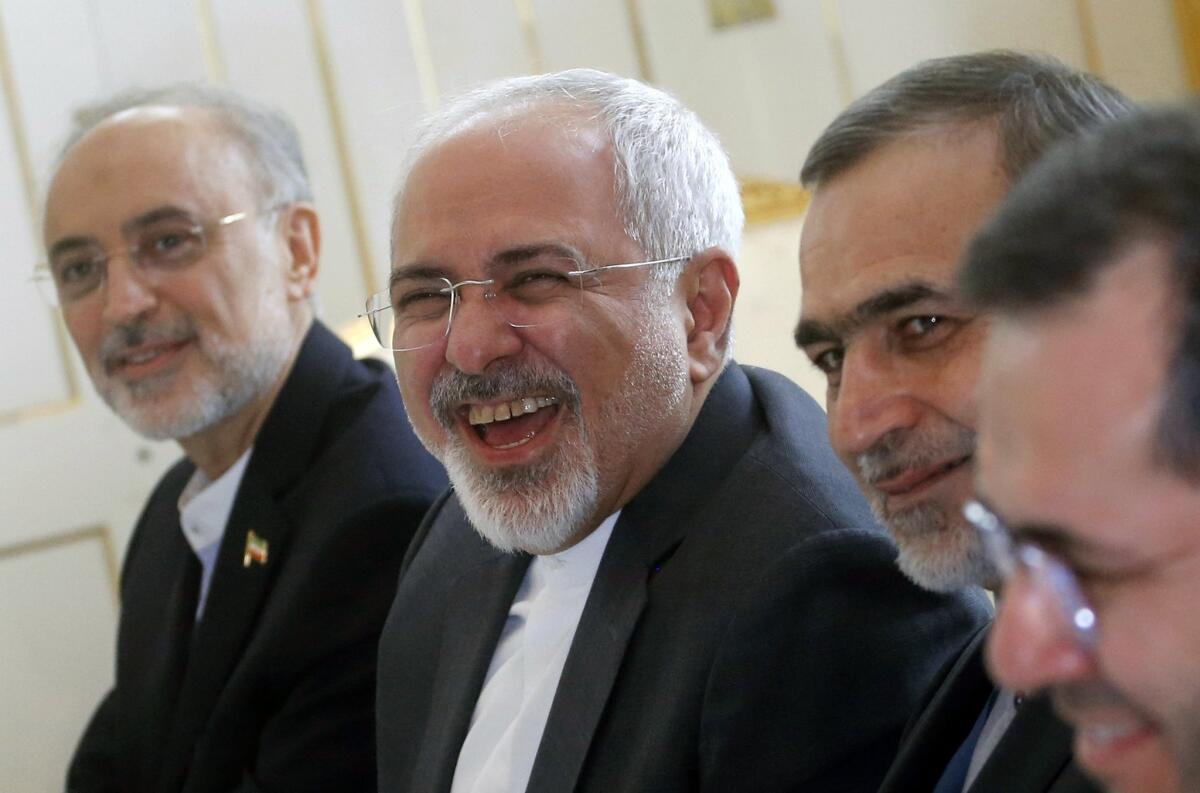Missing deadline, Iran nuclear negotiators push it back a week

Iranian Foreign Minister Mohammad Javad Zarif laughs during a meeting with U.S. Secretary of State John F. Kerry at a hotel in Vienna on Tuesday.
- Share via
reporting from vienna — Diplomats from six global powers and Iran gave themselves another week Tuesday to complete a comprehensive deal to curb Iran’s nuclear program as senior officials stepped up the pace of the difficult final negotiations.
After missing their self-imposed June 30 deadline to hammer out a deal, officials here said they will extend until July 7 an agreement that set preliminary limits on Iran’s disputed nuclear activities and allowed a modest easing of some sanctions.
The announcement suggested progress after two days of concern that negotiators were backsliding and were clashing over terms of an interim nuclear agreement that they announced April 2.
Speaking at the White House, President Obama reinforced those hints of conflict Tuesday by warning that Iran needed to stick to its agreement and could not backtrack.
“So there are still some hard negotiations to take place,” Obama said at a news conference with visiting Brazilian President Dilma Rouseff. “But ultimately this is going to be up to the Iranians to determine whether or not they meet the requirements that the international community has set forth to be able to fairly and accurately and consistently assess whether or not they have foreclosed the possibility of obtaining a nuclear weapon.”
Given Iran’s past behavior, he added, “that can’t simply be a declaration by Iran and a few inspectors wandering around every once in a while; that’s going to have to be a serious, rigorous verification mechanism.”
White House aides have said any agreement with Iran must include intrusive inspections by nuclear experts from the International Atomic Energy Agency, the United Nations nuclear watchdog agency that is based in Vienna, to ensure full compliance. Iranian officials have said they would not allow unlimited inspections.
Iran and six world powers — the United States, France, Britain, Germany, Russia and China — are trying to reach an agreement that would ease economic sanctions on Iran if it accepts curbs intended to keep it from building or obtaining a nuclear weapon.
After a two-day visit to Tehran, Iranian Foreign Minister Mohammad Javad Zarif returned to Vienna on Tuesday, insisting that Iranian leaders have given him full authority to negotiate a deal.
“I already had a mandate,” Zarif said. “And I’m here to get a final deal. And I think we can.”
Zarif brought with him two important Iranian officials, Ali Akbar Salehi, head of Iran’s nuclear organization, and Hossein Fereydoun, who is the younger brother and advisor to Iranian President Hassan Rouhani.
Salehi has been seriously ill. But his technical knowledge has made him important in resolving nuclear issues, working at the talks in collaboration with U.S. Energy Secretary Ernest J. Moniz.
Salehi also is well positioned to resolve broad policy issues because he is close to supreme leader Ayatollah Ali Khamenei and conservatives in Tehran.
“He could serve as a ‘closer,’” said Cliff Kupchan, an Iran specialist and chairman of the Eurasia Group risk-assessment consulting firm.
Zarif’s unusual departure Sunday had raised questions about whether the two sides had hit an impasse on some issues.
On Monday, U.S. officials hinted at a behind-the-scene conflict. They warned that they wouldn’t agree to a deal unless Iran followed the terms set out in the agreement reached in April.
Secretary of State John F. Kerry met with Zarif for nearly 90 minutes Tuesday morning, for what Kerry later described as a “good conversation.”
Kerry met later for two hours with Russian Foreign Minister Sergei Lavrov.
If negotiators don’t complete their deal by July 7, U.S. officials will have to rush to meet a July 9 congressional deadline.
Unless the Obama administration gives lawmakers the completed deal and related documents by midnight July 9, Congress will have 60 days, rather than 30 days, to consider whether it wants to support or oppose the agreement.
The White House wants to avoid that delay for fear that it would give critics of the agreement more time to try to block it.
Follow @RichtPau for coverage of international affairs
More to Read
Sign up for Essential California
The most important California stories and recommendations in your inbox every morning.
You may occasionally receive promotional content from the Los Angeles Times.











